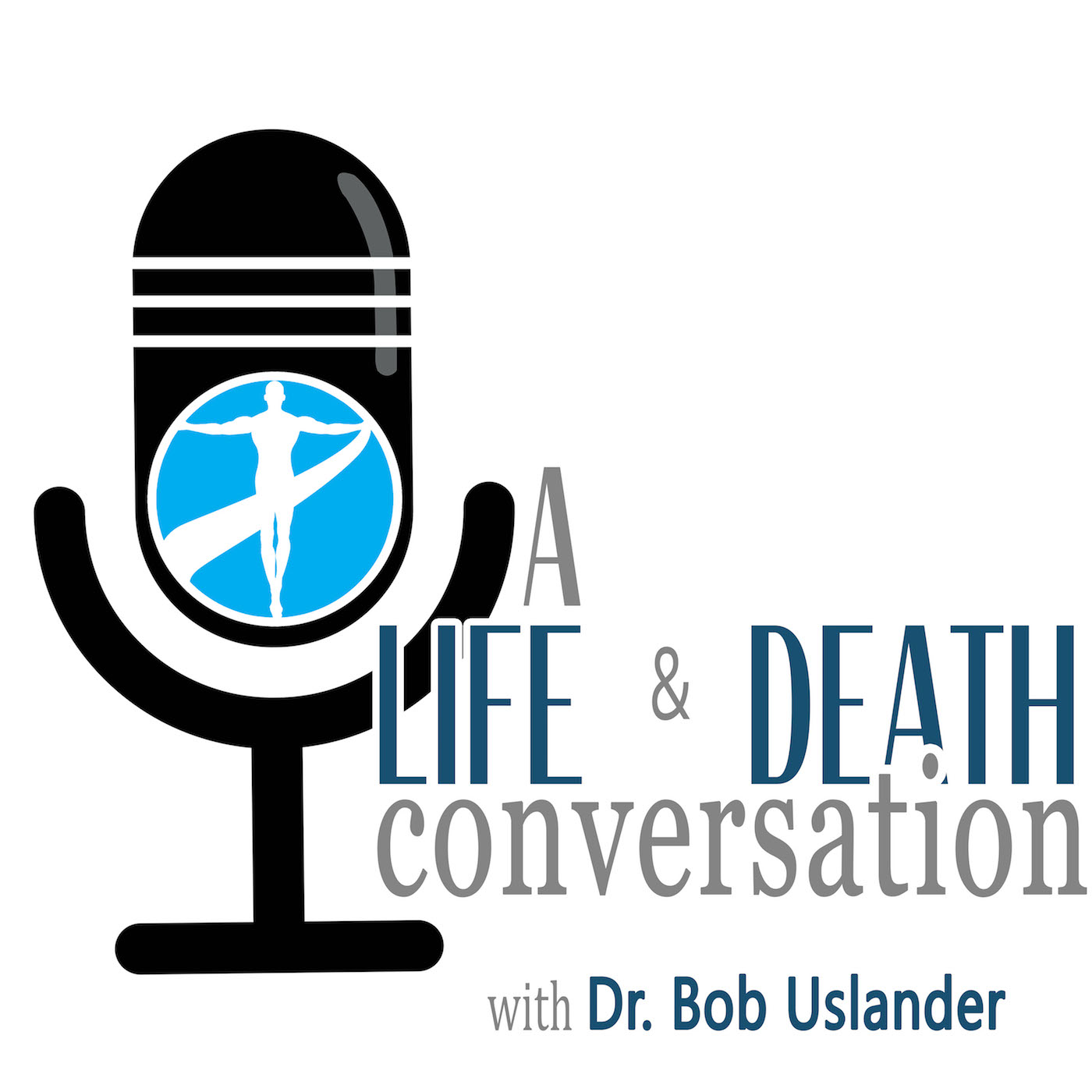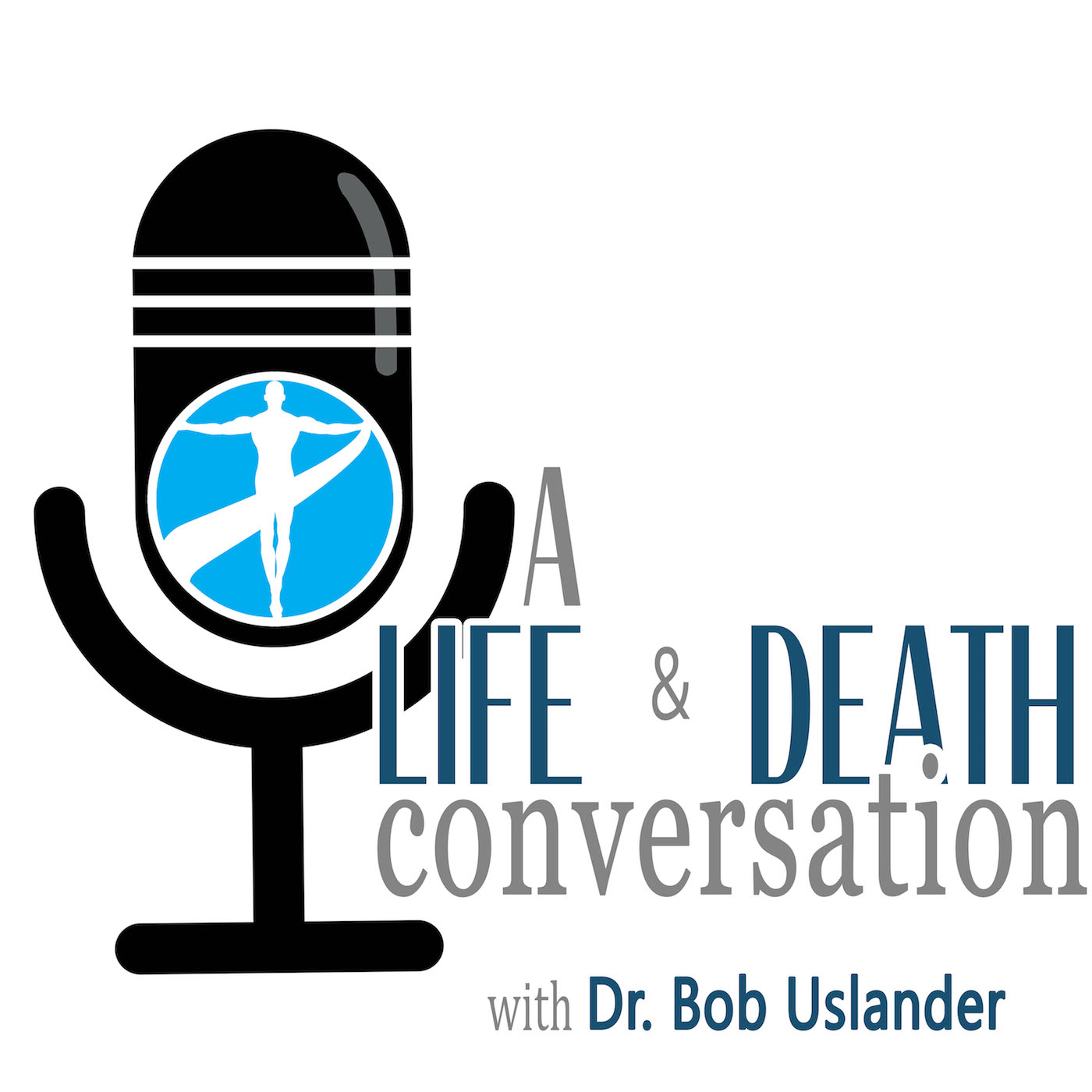Understanding Palliative Care, Dr. Michael Fratkin Ep. 29
Description
Dr. Michael Fratkin founded ResolutionCare to insure capable and soulful care of everyone, everywhere as they approach the completion of life. Learn how telehealth applications are bringing a greater quality of living and dying to those in need.
Contact
Transcript
Note: A Life and Death Conversation is produced for the ear. The optimal experience will come from listening to it. We provide the transcript as a way to easily navigate to a particular section and for those who would like to follow along using the text. We strongly encourage you to listen to the audio which allows you to hear the full emotional impact of the show. A combination of speech recognition software and human transcribers generates transcripts which may contain errors. The corresponding audio should be checked before quoting in print.
Please note there is some content that is explicit in this episode.
Dr. Bob: Dr. Michael Fratkin is the President and Founder of Resolution Care. Dr. Fratkin is a father, a husband, a brother, a son, a physician, and a very dear friend of mine. Dr. Fratkin is dedicated to the well-being of his community and the community of all human beings. Since completing his training, he's made his home and built his family in rural Northern California. He's served his community as a primary care physician in the community health system, as a medical director of the local hospice, as a leader in the community hospital medical staff, and has been a transformative voice for improving the experience for people facing the end of life.
At a time of great demographic and cultural change in our society, Dr. Fratkin has created Resolution Care to ensure capable and soulful care of everyone, everywhere, as they approach the completion of their life. Resolution Care is leveraging partnerships with existing healthcare providers and payers to provide telehealth services that bring a greater quality of life and greater quality of dying. The palliative care team at Resolution Care openly shares their expertise and mentorship so that people can receive the care they need, where they live, and on their own terms.
In this podcast interview, Dr. Fratkin shares his passion and his intimate experience as a provider of care. He's innovative; he's creative, he's dedicated beyond what I've experienced with just about anybody else who I've communicated with about palliative care and end-of-life care. I think you're gonna find this podcast to be incredibly informative and really interesting.
Okay, Michael, thank you so much for taking time out of your day. I know you've got lots of irons in the fire and lots of people vying for your attention. So I really appreciate having time to connect with you.
Yeah. You know, it's interesting. I always enjoy talking with you. We connect sporadically, not as much as either of us would probably want, but we have been pretty consistent in finding times to connect and catch each other up on what's happening with our lives and our different enterprises. And what's interesting is, after our conversations, I always think to myself, "I wish other people could have heard that. I wish other people had a chance to listen in and hear what we're developing, and sort of the passion that comes out in these conversations." They're so informative, for me, and I find it so inspiring to hear what you're doing and the service that you're providing and creating. So today we have that opportunity so that people are going to be able to listen in on our conversation.
In the introduction, I shared a bit about what you're doing, who you are, but I'd like to have you just do a little synopsis of what Resolution Care is doing currently, where it started from its humble beginnings, and what your vision is for where this is heading.
Dr. Fratkin: I'm a dad, I'm a husband, I'm a brother, I'm a son, I'm a whole lot of stuff. But I'm also what's called a palliative care doctor. And your group of listeners probably know a little bit about what that is, but the way that I describe it for people is that there are really three central elements. That number one, we don't take care of any patients. We support people as they find their way through serious illness. We support people with a team; we support their families. Our team includes nurses, doctors, social workers, chaplains, nurse practitioners, community health workers, and all the people that they don't necessarily see, but that are just as important to creating a container for our care, the back office, and operational people.
So the first principle is, is that we are a person-centered, not a patient-centered, but a person-centered initiative. And that those persons, the reason I distinguish it ... It's not just the patients or their families, but the people providing the care that are centrally important to everything that we do. And then we build out from there.
So the first thing is, we're a person-centered organization, using a team to accompany people with serious illness as they navigate it, right?
Dr. Bob: I love it.
Dr. Fratkin: So the second thing that we do is that we're really damn good at managing symptoms. Our team has quite a bag of tricks around the treatment of pain and nausea, breathlessness, and various other physical manifestations of illness. And we know how to use that bag of tricks. So symptom control is the second thing. And the third thing is, we help people and their families to navigate what is a completely dysfunctional, fucked up if you don't mind me saying so-
Dr. Bob: Let's call that like it is.
Dr. Fratkin: Of fragments and silos and conflicting interests, and stakes held. We help people navigate, somewhat, through the complications of their illness, but more so, we recognize that people are trying to make their way through a human experience, not a medical one. And so, we help them navigate through that, bringing the personhood that we are to accompany them with the wisdom, skills, and shortcuts and strategies that we know about navigating. So it's person-centered around the people we care for and us as well. We matter, too.
It's impeccable symptom control, and it's navigational assistance. And really tough times of life in a really complicated health care system. So Resolution Care does that. And we use some technology tricks, video conferencing, all of our care is based in the home. And that's that. But I think I also wanna tell you about how I got here and why.
Dr. Bob: Please do.
Dr. Fratkin: So I came to far Northern California, Humboldt County, in 1996 and joined a community clinic environment as the only internist in a five-clinic system. And my job was to take on all the patient V patients and all the complicated conditions that provided kind of complex case management approach for the heavy hitters, the outliers, the hot spotters. They're called lots of things now, but they were just languishing without the attention they needed when I showed up in town. And for six years, I took the hardest cases in the system, and helped with diagnosis and treatment planning, and burned out rather quickly, because I didn't have a team.
I then sort of shifted my attention to my deep connection with hospice work and became a hospice medical director, where I did have a team. But I also had a very constraining box around me, a structure of hospice defined by the Medicare benefit that was limiting our ability to do what made sense, rather than meeting all of the regulation and compliance that continues to accumulate in the hospice model of care. And I burned out again. And then, I did some hospital work. When I started, I was seeing 9-12 people in a day, and I really enjoyed being at the point of the sphere where people were sick enough to be hospitalized and to attend to them both with good medicine, as well as a respect, and frankly, love in the face of what they're going through.
And that was great until they started to push me to see 15 or 18. And now, it's 22 patients in a 12-hour shift. And I burned out again. And all the while, paying attention to the rising credibility and relevance of the palliative care movement. So I became first certificated in 2000, and board-certified a few years after that, in palliative care. In 2007, I worked with the hospital to launch a guided care consultation service in the hospital. And as soon as I got started doing that, there was almost immediately, four or five times as many people as I could care for.
And I wasn't able to scare up the resources in the hospital to build out a team. So for a period of years, I wrote business plans, I went to committee meetings, I tried to advocate for greater resources to do this good work correctly, and failed to do that. So in 2014, I had had it. Exasperated, fatigued, burned out, I guess for the fourth or fifth time. God knows I can't keep track. I was looking for a job. I figured I couldn't stay here in this beautiful community, because I couldn't figure out how to get a sustainable job with a team that builds capacity over time.
And so, I looked for work. And as you know, Bob, a palliative care doctor these days doesn't have to go too far to get too many interviews. I had three interviews in three weeks in the Bay area, and on the way to the Bay area. And they offered me three jobs, quickly, were better resourced, better compensated, more controlled work hours, but none of them were where I lived, where I made my home, where my kids were born in my house. I live on this five-acre piece of redwood forest. My kids were born there. My dogs and cats are buried in the yard.
And I didn't wanna leave. So come around spring of 2014, I started to think about maybe there's a way to bui







